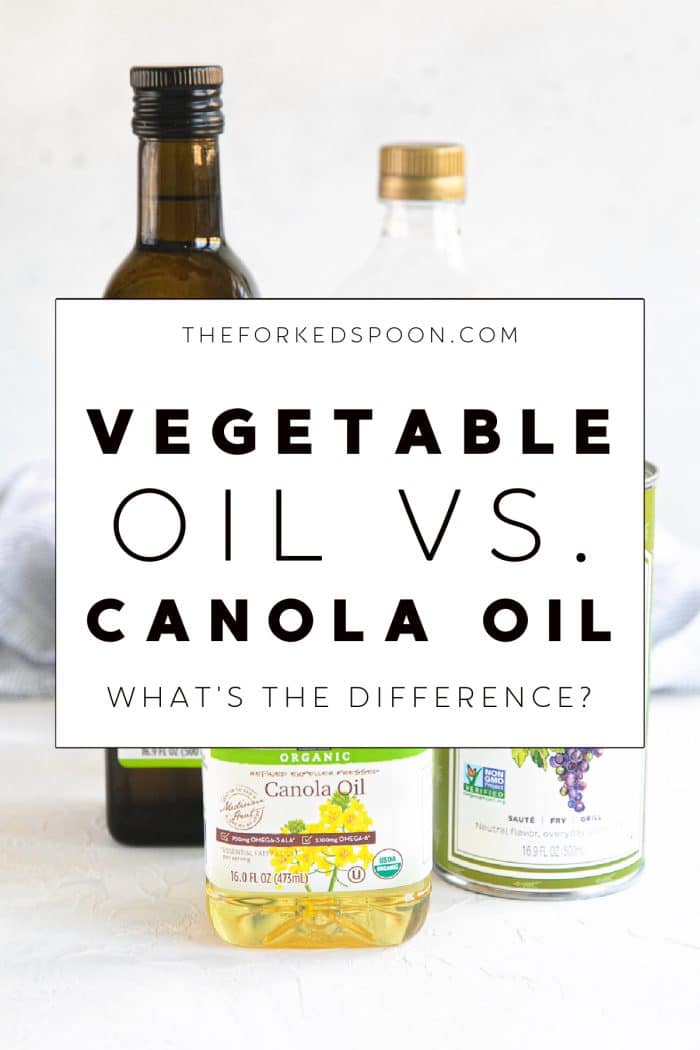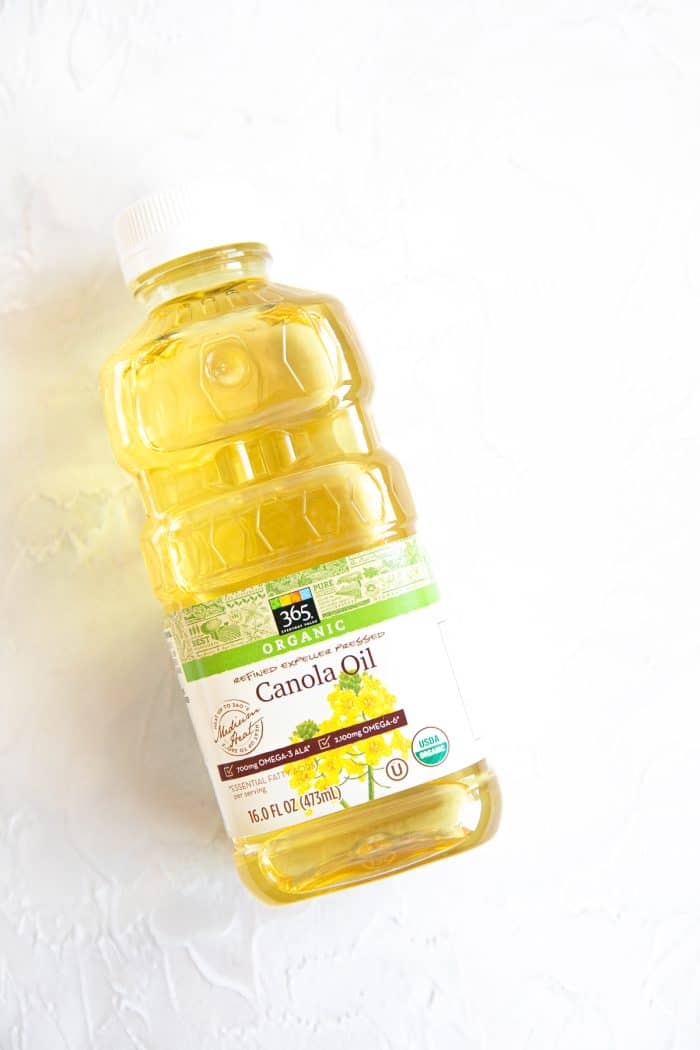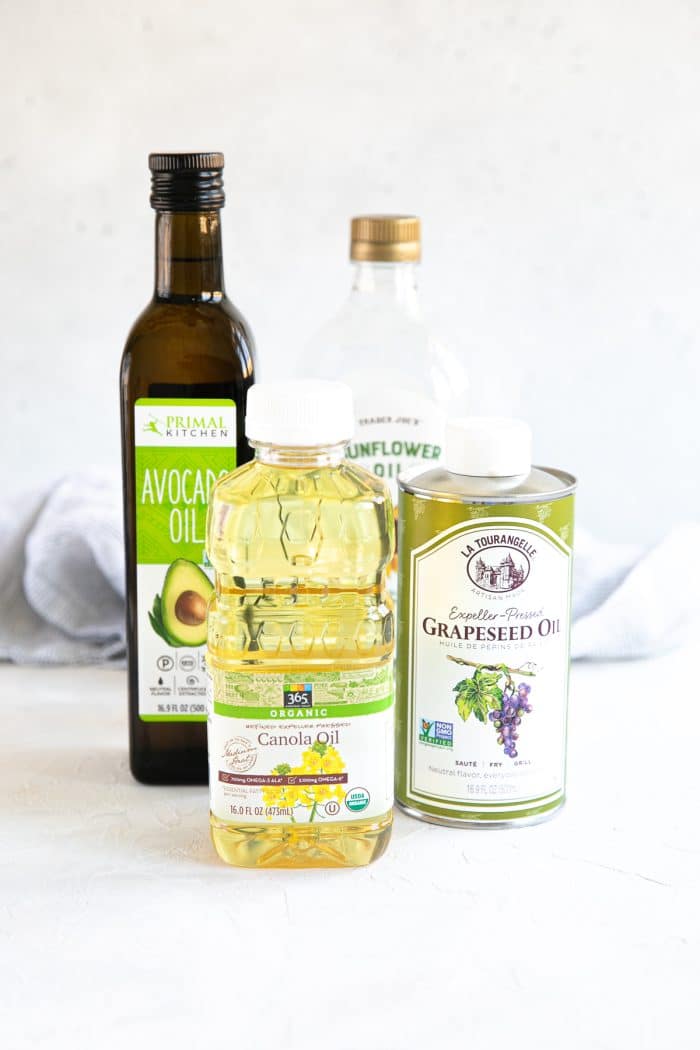Today we’re comparing Canola Oil vs. Vegetable Oil, looking at characteristics, uses in the kitchen, and the key health information of each. Let’s get right to it!

We’ll never be preachy about the health of certain foods, but when it comes to feeding family members and other loved ones, we have to give you the full story.
What is Vegetable Oil?
At first glance, vegetable oil may seem too broad of a term. Does it really encompass ALL oils derived from vegetables on the planet?
The common knowledge is that vegetable oil is a blend of oils from many different plants, which is how it gets its vague name.
There are no rules for percentages or ratios of veggies in each blend.
This gives producers a lot of flexibility in the manufacturing process and leaves consumers with a few question marks. Sure, the oil comes from vegetables, but which ones, and how much of each?
According to a list from TIME Magazine Online, one might find soybean oil, safflower, avocado oil, sunflower, rapeseed, and corn in any given vegetable oil blend.
Keep your eyes open for products that explicitly list the types of vegetables used to produce the oil. The more transparency, the better. Nutrient-rich veggies are always preferred.
Unfortunately, the refinement process means that many essential nutrients are stripped away from the vegetable oil. This is where extra virgin olive oils have a key advantage.
Vegetable oil gains an advantage, however, with its neutral flavors and its high-heat smoke point, meaning it has a huge amount of versatility in the kitchen, especially for baking more complex creations.
Realize that no two vegetable oils have the exact same ingredients, but the effect in the kitchen will ultimately be the same no matter which one you choose.
Whether it’s derived difference sources like soybean oil, corn oil, sunflower oil, or a mix of vegetables you don’t recognize, you’ll have a neutral, versatile cooking oil that will take you far in any of your culinary endeavors.
What is Canola Oil?
Most of us know that canola oil comes from vegetables, but which type exactly? And why is it not just called vegetable oil like the ones we discussed earlier?
In short, there are a series of strict regulations that producers must meet in order to label their products as canola oil, just like the regulatory boards of wine and cheese in Europe.
In Canada, they take their canola very seriously!
The Canola Council of Canada explained that the name of the country’s prized crop is a mashup between Canada and Ola, which means oil.
The canola plant itself is a member of the botanical family known as Brassica, which is also home to cabbage, cauliflower, and mustard plants.
Each canola seed is an economic powerhouse, producing 44% pure oil and 56% high-protein meal. That means that very little, if any, of the seed goes to waste. What doesn’t end up on the grocery store shelves as oil just goes to the farm to feed livestock.
Canola doesn’t mean only power humans and animals; it serves as a low-emissions biofuel for vehicles and machinery in many applications. This miracle plant could save the world someday!
In all seriousness, canola oil does not differ hugely from vegetable oil in terms of its pure use.
These are both neutral cooking oils that can be used for multiple purposes and at high temperatures. Just remember that canola oil is generally of higher quality due to its tighter restrictions on production.
Health Information
Many of us view oil as a necessary evil in the kitchen. Just like butter or ghee, it often goes unspoken.
It’s the culprit behind all those guilt-inducing, greasy foods, but most recipes need a little bit to get things moving. It’s just one of those things we can’t avoid as home cooks!
We hear a non-stop barrage of health benefits about olive oil and coconut oil, but those don’t fit the bill for many of the dishes we cook.
The truth is that not all oils are equal, and each one has its own advantages and downfalls.
After all, these are processed products, and they are often mass-produced.
Are any of these claims justified, and is there a silver lining as far as nutrition goes?
Let’s clear one thing up now: the process does not necessarily equal bad. Every plant must go through some type of process to become oil in the first place!
The extraction method is critical here. Keep your eye on a few key things:
- If possible, try to select vegetable and canola oils that say expeller pressed on the label, since these products typically contain fewer trace elements of dangerous compounds such as hexane.
- Also, look for oils that say cold-pressed if available, as this is arguably the healthiest version of the product with the lowest number of unwanted additives.
- Just because vegetable oil has been processed or refined does not mean it has extra chemicals or additives included in the final products. Always go case by case!
According to an article from expeller press manufacturer GoodNature, the process of extraction from seeds and nuts is a big deal when it comes to health.
When processed at lower temperatures, oils retain most of their antioxidants and vitamins, but at higher heats, they lose these key components and may even contain toxic elements.
Those super-cheap, big-box vegetable and canola oils may be appealing in volume and price, but be wary of how the manufacturer brought it to market at such a low cost.
With that in mind, canola oil is often considered a healthier option, simply because we know it’s a more consistent product.
- Unlike trans fats, it’s a great source of monounsaturated fat, which is among the healthiest fat compounds
- Contains vitamin E and even alpha-linoleic acid (ALA), which is hard to find naturally
- Some products boast the presence of almighty omega-3 fatty acids
Let’s be clear; these healthy features are just bonuses and should never be your main sources of these nutrients.
We should all know not to go overboard with vegetable oil or canola oil since it can have adverse effects on blood pressure and cholesterol.
Just stick with our recommendations when it comes to proper usage (and don’t be deep-frying something new every night), and you’ll be just fine.
Best Recipes
We like to think of ourselves as a healthy recipe site, but there is no shortage of recipes that call for either canola oil or vegetable oil.
If you want neutral flavors and a high smoke point (~400 degrees), you’ll want to go with vegetable oil every time. It’s perfect for caramelizing onions or getting the perfect level of crispiness on skillet chicken and potatoes.
Canola oil has a similar smoke point but can add a bit more flavor to the mix. We think it is a great option for making garlic steak bites in a pan or putting together a quick poppy seed salad dressing.
Olive oil is the darling of the cooking world, but when it comes to making spicy Cajun “Dirty” rice, we can’t avoid the truth that vegetable oil makes for a tastier dish overall.
In the realm of baking, it’s hard to compete with canola oil, and when you’re making a decadent dessert, it’s just not worth cutting corners to save a few calories.
Our carrot sheet cake is a great example of canola oil doing what it does best: holding together a sweet and savory treat that isn’t too heavy or starchy.
We also like canola oil for stir-frying meals and sautéing because it brings out the best in flavors like soy sauce and rice vinegar.
It’s ideal for cooking chicken and veggies in a single pan, not to mention it’s fun to layer on new flavors and spices while tossing it all together!
Conclusions
From the pantries of home cooks to the cabinets of the world’s best restaurants, cooking oils are just a universal part of the culinary experience.
They may not be the star of the show in any particular recipe, but just like the oil of a car, we need a little bit to make sure everything works properly!
Who wins the great canola oil vs. vegetable oil debate? We can’t pick just one! Each type is best suited for certain scenarios, and you’ll have to pick up a bottle of each to figure out their intricacies.
Just run through this list of tips whenever you get fuzzy on the details.
- Remember to look for less-refined products that still contain higher levels of nutrients
- Cold-pressed and expeller-pressed are your friends
- It is worth spending a bit of extra cash on getting the best quality oils from the top shelf
- A little goes a long way with any type of cooking oil, so avoid overdoing it!
Make sure you bookmark the Forked Spoon and sign up for our email newsletter for future ingredient showdown articles! We’ll be covering different types of household staples to expand your knowledge.





Last Updated | 0 Comments